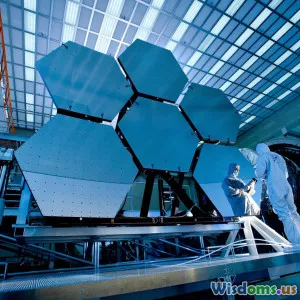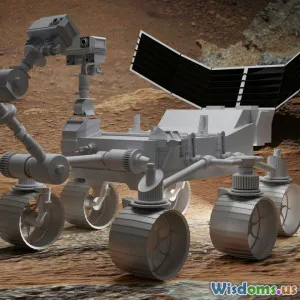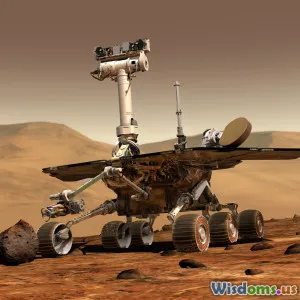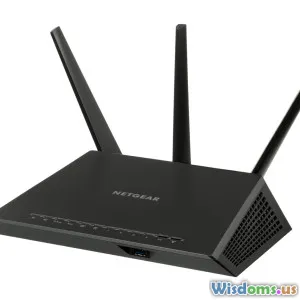
Futuristic Concepts in Science Fiction
8 min read Explore visionary futuristic concepts in science fiction and their profound impact on technology and society. (0 Reviews)
Futuristic Concepts in Science Fiction: Shaping Tomorrow
Science fiction has long served as humanity's visionary lens, imagining what the future might look like through enthralling storytelling and bold concepts. From starships cruising far-off galaxies to sentient artificial intelligence pondering their existence, sci-fi challenges the boundaries of science and imagination alike. But these aren't merely flights of fancy; many of these futuristic concepts have spurred real-world technological advancements, ethical debates, and philosophical reflections about humanity’s path forward.
In this article, we delve into the most iconic and innovative futuristic concepts that science fiction has gifted to our collective imagination, exploring their origins, societal impact, and the ways they continue to inspire progress.
The Power of Science Fiction to Predict and Inspire
Author Arthur C. Clarke famously said, “Any sufficiently advanced technology is indistinguishable from magic.” This magic often first appears in science fiction—conceived carefully by writers who envision technologies before they materialize in laboratories and factory floors.
Science fiction serves two primary roles:
- Predictive: Foreseeing future technological and societal developments.
- Inspirational: Encouraging scientists, engineers, and policymakers to pursue unprecedented innovations.
Example: The Mobile Phone
The concept of a portable communication device appeared as early as Martin Cooper's prototype mobile phone in 1973, but even before that, sci-fi shows like Star Trek featured the now-iconic communicator device, directly prefiguring real mobile phones. This shows science fiction’s remarkable ability to seed ideas that culture and industry eventually realize.
Key Futuristic Concepts in Science Fiction
1. Artificial Intelligence and Sentient Machines
Artificial Intelligence (AI) has fascinated sci-fi authors for over a century, from early works like Karel Čapek’s play R.U.R. (Rossum's Universal Robots) that coined the term “robot,” to the complex androids in Blade Runner and Ex Machina. Sci-fi also explores the implications of AI surpassing human intelligence — the so-called “singularity.”
- Real-World Relevance: Advances in machine learning, natural language processing (like GPT models!), and robotics continue to push AI closer to sci-fi depictions.
- Ethical questions: What rights might sentient AI possess? How should we handle potential existential risks?
Dr. Kate Darling of MIT highlights this connection succinctly: “Science fiction is often the warning system for society—we imagine futures to interrogate our present relationship with technology.”
2. Space Exploration and Colonization
Humankind’s fascination with space breaks new frontiers in both fiction and reality. Iconic works from Isaac Asimov’s Foundation series to The Expanse thread themes of colonizing new planets, interstellar politics, and the challenges of human survival beyond Earth.
- Examples: Elon Musk’s SpaceX aiming for Mars colonization and NASA’s Artemis program embody real efforts reflecting science fiction’s ambitions.
- Concepts explored: Terraforming, multi-generational starships, and first contact scenarios.
3. Virtual and Augmented Reality
From William Gibson’s Neuromancer to the recent sensation Ready Player One, immersive virtual worlds serve as playgrounds for imagination and commentary on digital identity.
- Current realities: VR headsets and AR applications are increasingly mainstream in gaming, education, and industry.
- Philosophical questions: What happens when virtual experiences rival or surpass real-life experiences? How do virtual realities impact human relationships and cognition?
4. Human Enhancement and Cyborgs
Futuristic sci-fi delves into human augmentation — from genetic engineering in Gattaca to cybernetic implants in Ghost in the Shell.
- The real edge: Gene editing tools like CRISPR promise possibilities that once seemed fantastical, while prosthetics paired with neural interfaces are restoring or enhancing human capabilities.
- Ethics in focus: How do we ensure equity and prevent societal divides based on access to enhancements?
5. Time Travel and Alternate Realities
Despite their challenging scientific feasibility, time travel narratives captivate audiences by exploring causality, destiny, and paradox.
- In fiction: The Terminator and Doctor Who use time travel for thrilling plots and philosophical musings.
- Scientific viewpoint: While theories like wormholes provide speculative bases for time travel, it remains largely theoretical.
Societal Impact of Sci-Fi Futurism
Science fiction's futuristic concepts are more than speculative stories—they influence culture, policy, and technological moderation.
Technology Development
Many engineers and entrepreneurs credit science fiction for sparking their interest in STEM fields. The 2014 survey by the IEEE showed that 40% of engineers and scientists cited sci-fi as an inspiration to enter their profession.
Ethical Frameworks
By dramatizing scenarios with advanced technology, such as AI rights or surveillance dystopias, science fiction provides a sandbox for ethical considerations long before technology becomes widespread.
Cultural Reflections
Futuristic concepts often reflect contemporary concerns—whether it’s climate change, authoritarianism, or humanity’s search for meaning. Thus, science fiction functions as a cultural barometer.
Conclusion: Embracing the Visionary Horizon
Futuristic concepts in science fiction are indispensable guides, illuminating paths humanity might take. They merge creativity with cautious foresight, emboldening us to ask uncomfortable questions while dreaming of astonishing possibilities.
As we stand on the cusp of quantum computing, AI, and interplanetary travel, science fiction’s speculative visions remind us that tomorrow is an unwritten story. Perhaps the greatest action we can take is to wield these concepts thoughtfully, balancing innovation with humanity’s ethical compass.
In the words of Octavia Butler, a pioneer of speculative fiction: “Science fiction is the only literature that attempts to imagine the future of the whole species.”
By engaging deeply with futuristic concepts, we are not only uncovering fascinating tales but collectively crafting the blueprint for our shared future.
References:
- Clarke, Arthur C., "Profiles of the Future," 1962.
- IEEE Spectrum Survey, "What Inspired You to Be an Engineer?" 2014.
- Darling, Kate. "Robotics and the Ethics of AI," MIT Media Lab.
- Musk, Elon. "Making Humans Multi-Planetary," SpaceX Presentations.
Rate the Post
User Reviews
Popular Posts





















